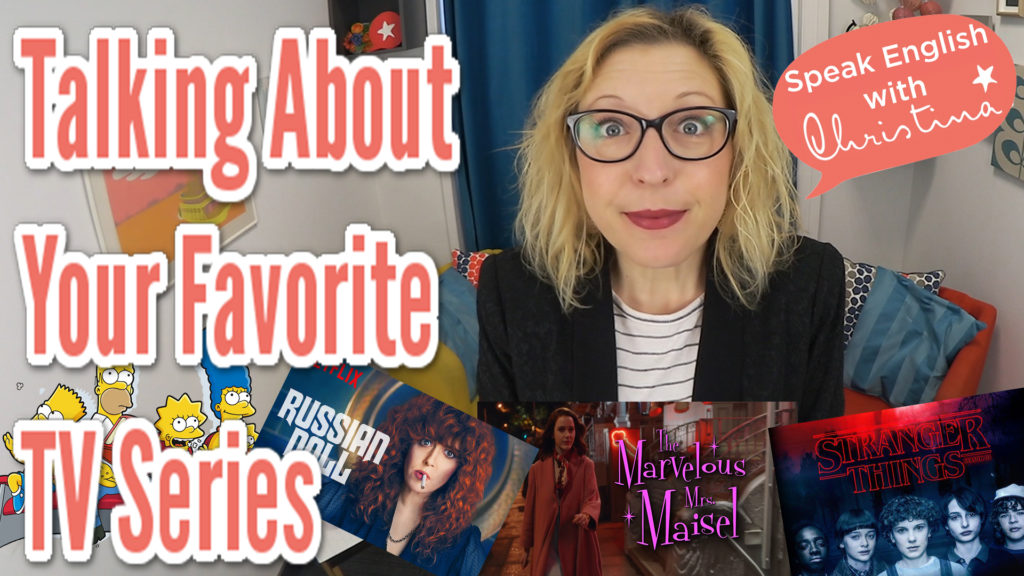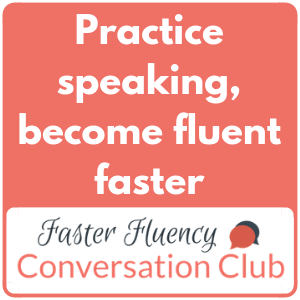Do you like watching TV? Most Americans watch TV, and I’m going to take a guess that you enjoy watching TV too! The only thing Americans enjoy more than watching TV is talking about their favorite TV series with their friends and colleagues.
In this episode, we’ll cover some of the basic vocabulary to know so you can talk about your favorite TV series in English. If you’re looking for a good show to watch, I’ll suggest a few of my favorites too.
Let’s go!
You probably know by now that if you’re serious about learning English you must practice speaking in English. The more often you practice your English, the more natural and spontaneous you will feel when you speak English.
If you’re interested in gaining fluency faster and being able to have natural conversations in English then join my Faster Fluency Conversation Club. The conversation group meets three times per week and is guided by one of my fantastic expert English teachers who will help you with vocabulary, correct your mistakes, and much more so can you gain fluency faster.
If you’re watching television in English, you’re probably very proud of yourself when you understand what the actors are saying. And if you can follow along with the storyline, you feel like…
“I’m King of the World!”
Or…
“Adrian! Adrian!”
Or… if you’re feeling like you didn’t quite understand something, you might feel like saying…
“Hello, Newman.”
Can you tell I watch a lot of media?
For most people, the experience of watching a television show and getting “caught up in” the story – or fascinated by it is a social experience. You want to share it with others. One way to do this is to have a conversation about the TV series you are watching or enjoyed.
Following your favorite TV series and talking about it with others isn’t just a great way to practice your English, it’s also a way to make English-speaking friends. Fans of your favorite show may be friendships waiting to blossom. So how do we talk about television shows? We need to know certain Television vocabulary words.
Useful TV vocabulary
Episode: An episode is one installment of the TV series. It’s kind of like a chapter in a book. An episode may be 22-minutes in duration or 60-minutes in duration. How many minutes in an episode varies, depending on the TV series.
For example: “Last night’s Game of Thrones episode was action-packed.”
Show: A show can mean either the name of the tv series or a single episode of the tv series. Episode and show can be used interchangeably.
For example, “What’s your favorite show?” … “My favorite show is Black Mirror.” Or“Are you going to watch your show tonight?” … “When is your show on?”
Season: A season is a group of episodes for your TV series. A TV series may “run” or be programmed for just one season – or if your favorite scripted TV series is The Simpson, it’s been on for 20 seasons.
Season premiere: A season premiere is the very first episode of a season. It’s like the birth of your television show. Awe! So cute.
Season finale: The last episode of a season. Often lots of twists and misdirection, ending with a cliffhanger. These are very mean story developments because you often have to wait months until the next season begins before you can find out the reveal.
For example “Did you see last night’s season finale?”
Binge-watch: Kind of like “binge-eating” – but “consuming” or watching an entire tv series of episodes or shows in a single weekend or sitting – I’ve done this.
Some TV series in English I like… and you might like too!
Isn’t this great? I’m your language teacher and I’m encouraging you to watch more television. I bet your school teachers never did that!
If you’re looking for some TV shows in English to get hooked on or addicted to, here are a few that I’m watching… I’m a huge fan of Amazon Prime’s series Marvelous Mrs. Maisel. This show is set in the 1950s, in New York City and is about a woman who sets out on a career as a stand-up comic after her husband leaves her.
Comedy is often one of the nuances of language that are more difficult to understand for language learners because it requires understanding the culture, in addition to vocabulary and grammar. If you don’t understand all of the punchlines, in this series, don’t worry about it! Just watch and enjoy the humor as best as you can.
If you liked the movie with Bill Murray called, “Groundhog Day,” then you may like the Netflix series “Russian Doll.” The premise or concept is very similar. “Russian Doll” is about a woman who experiences the same evening over and over again. After the end of the evening, she dies, a different way each day. Then, she wakes up the next day – which is really that same day– as if nothing happened, but she can remember that she died and came back to life.
Confused? Me too. It’s confusing even for English speakers, but that’s part of the fun: trying to understand what’s happening in this woman’s life. Why does she die every day? And how does she come back to life? And then she meets a guy who has the same problem… You have to see it.
If you like sci-fi or horror, then you may enjoy “Stranger Things.” This Netflix show is set in the 1980s and the pop culture of that decade. If you grew up during the 1980s, then you may be able to relate on some level to the nostalgia.
The series replicates the ‘80s fashion, with the stonewash jeans and leg warmers, and even one of the cult actresses of the 1980s – Winona Ryder – is a main character. It’s a lot of fun seeing her perform a role that goes beyond the usual teenage outcast that she played in the 1980s. Hopefully it’s a career comeback. The series also has a fantastic soundtrack – that is, the music is great.
If you like Stephen King and are still fascinated by questions you asked when you were a kid, like “is that a monster under your bed?” then you’ll like this show.
Are there any binge-watch worthy TV series you can recommend for your fellow English learners?
If so, share them in the comments!
I’m happy that you want to practice your English and talk about your favorite shows. If you want even more practice, consider my Faster Fluency Conversation Club.
Club members can participate in 3 group sessions per week. You will be paired up in small groups with other motivated students and a Fluency Trainer, either Trisha or Cara.
The small-group size ensures you get plenty of practice to speak American English and receive feedback on mistakes or suggest ways you can speak more colloquially, so you gain fluency faster.
You can get all the details and join the Fluency Club by clicking on this link. You’ll also get extra resources and a conversation guidebook, to help you increase your vocabulary and become more confident in conversations.
Thank you for learning with Speak English with Christina, and I’ll see you next time!






2 Comments